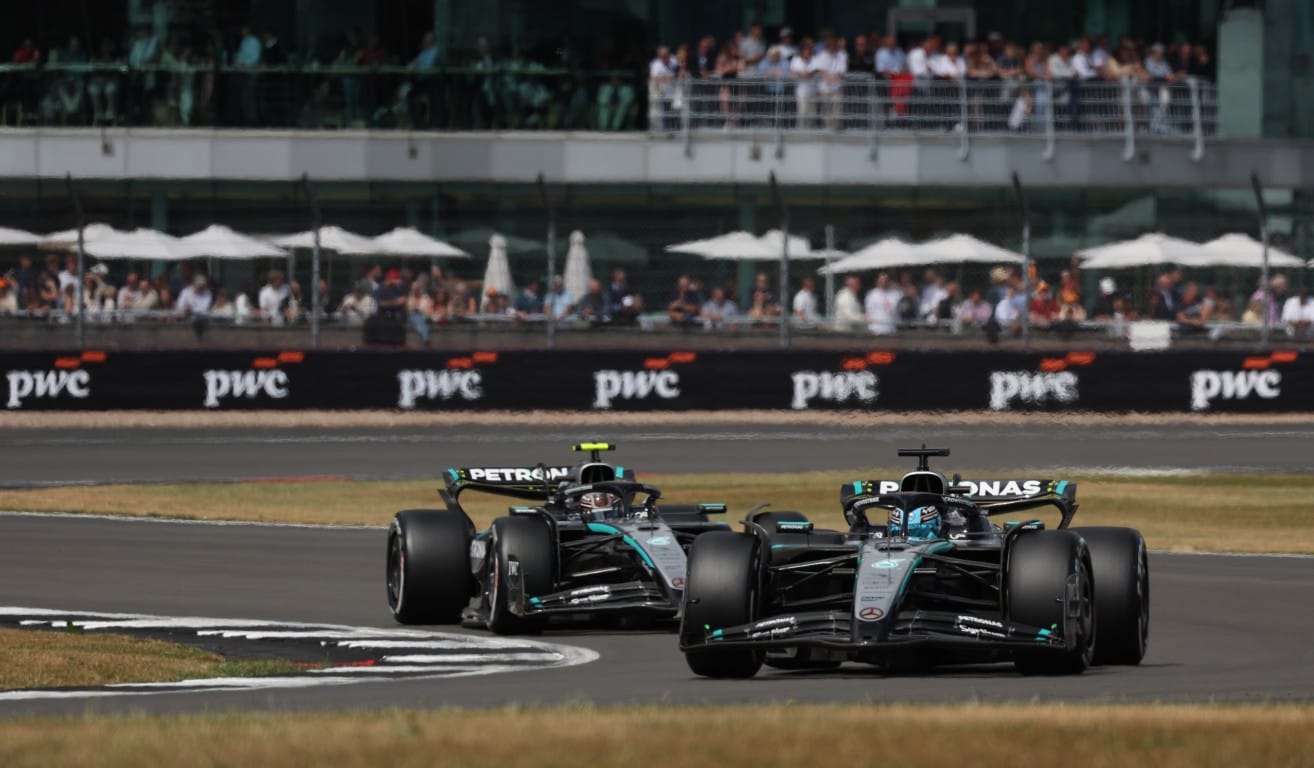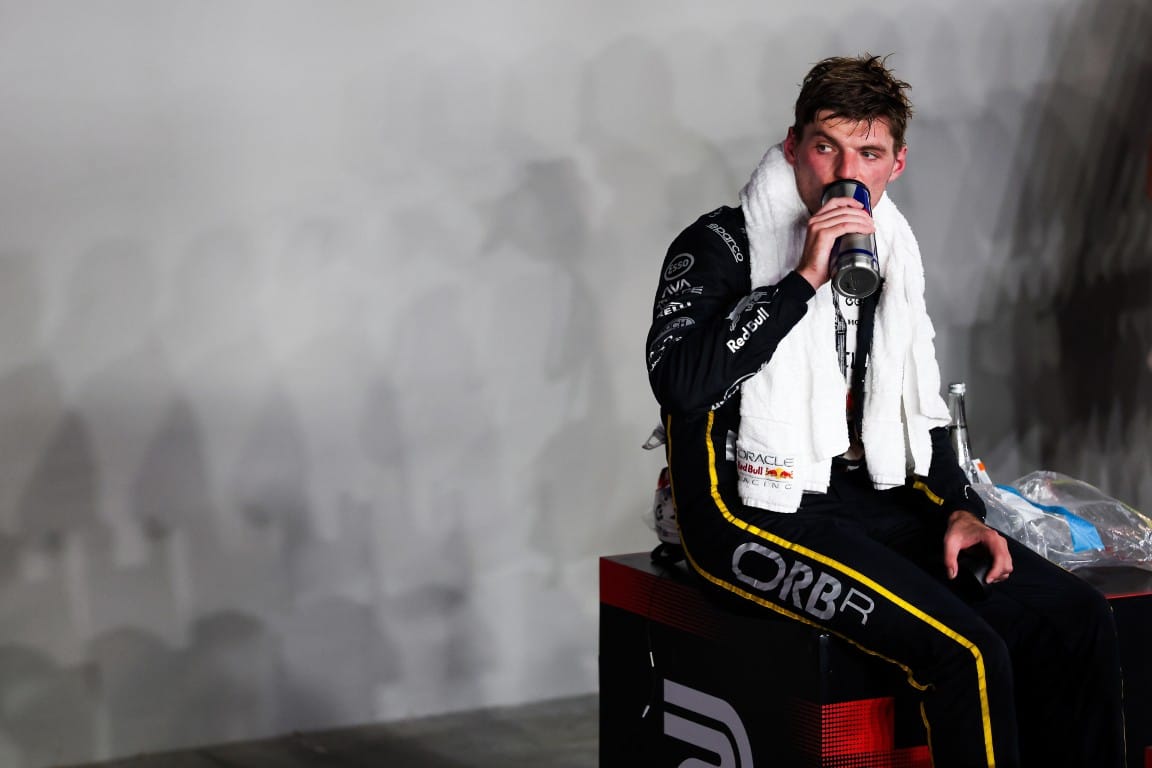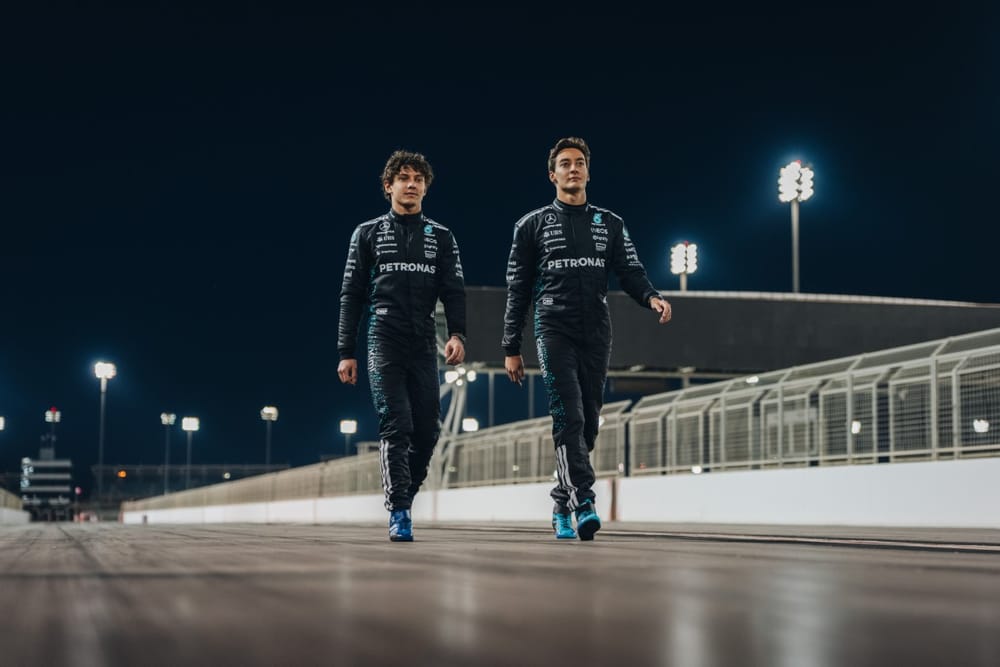George Russell's and Kimi Antonelli’s new Formula 1 deals that will keep them at Mercedes for 2026 came as a surprise to nobody on Wednesday.
With neither driver looking at options elsewhere, and Mercedes not interested in anybody else, it was a case of when not if for their contract renewals.
What was always going to be of greater interest was how long the pair were going to be locked down for – and that was something that was not immediately obvious from Mercedes’ announcement.
While its press release confirmed a driver line-up for 2026 now that contracts have been signed, there was no mention of how long the deals were for - or even if they were ‘multi-year’.
Mercedes’ statement only made reference that the pair “will continue as the team’s driver line-up into 2026”.
This was especially curious from Russell’s perspective - as there has been a great deal of intrigue about just how long his commitment to Mercedes would be for.
A single-season deal, versus one that stretched into at least 2027, has big implications for the wider driver market merry-go-round amid a likely shake-up in the order next year.
A multi-year package
Ahead of the huge uncertainty about how much F1’s 2026 rules revolution will stir the grid, teams and drivers have obviously been weighing up how much freedom they want to give themselves for the longer term.
A one-year deal has value in keeping options open for 2027, while a longer contract has the benefits of added security.
While a rolling contract for a youngster like Antonelli who is still proving himself would not be a surprise, when it comes to an experienced frontrunner like Russell, any single-season extension would have been slightly unusual.
This is especially true because Mercedes has often had the habit of announcing multi-year deals.

Indeed, Russell’s previous contract signing, which took place in 2023, committed him to a two-year extension for 2024 and 2025.
However, while Russell’s latest deal length was not explicitly announced, The Race understands that his new contract is a multi-year agreement that does indeed run into 2027.
However, the reason that length has not been detailed in public is that the squad does not want to get dragged into contract specifics – wary of that then fuelling wider speculation surrounding other drivers.
Furthermore, there is also a brutal pragmatism at play that with so much up in the air for next year, circumstances could well change and both parties may see things very differently in 12 months’ time.
There is little to gain in announcing a timeframe for a deal that cannot be 100% set in stone, because situations can evolve.
What is true now may not be correct in the future – just as Lewis Hamilton never saw out the two-year contract that Mercedes announced for him for 2024 and 2025.
Both Mercedes and Russell would like nothing more than to win world championships together, but to do that they both need to be performing at their peak – and fully believe in each other to deliver.
Drivers only want to be locked in at competitive teams; teams only want drivers on board who are delivering to their best. This above all else decides how partnerships develop - and much more than the official length of contracts.
Speaking earlier this year about the issue of the duration of any deal he was looking for, Russell said that everything rested on delivering on track.
He well accepted that if you perform you keep your seat; if you don’t, you get replaced.
“There's pros and cons in having short-term or long-term [deals],” he said. “For me, this season has proved more than ever that ultimately it always comes down to performance. The number that is stated in the contract is ultimately just a number.”
The example of Sergio Perez at Red Bull, who signed a multi-year extension last season before he was dropped at the end of the campaign, shows that contracts are not the be-all and end-all when it comes to keeping your seat.
Driver market shake-up
The realism at play in the contract situation comes with it being in both Russell and Mercedes’ interest to be open-minded about the long-term future – especially as F1’s driver market could kick off dramatically next season.
From Mercedes’ perspective, it has been no secret that it is keeping a close eye on Max Verstappen and how things shake out with his F1 future at Red Bull.
Verstappen is in theory locked down at Red Bull until the end of 2028, but it is understood that he has exit clauses in his contract that allow him to leave if certain performance targets are not hit.
It was the possibility of him being a free agent for next year if he was not in the top three of the drivers’ championship by the August summer break that triggered Mercedes scouting out its options earlier on in this campaign.
And Wolff will be well aware that Verstappen’s exit clause is even stricter on Red Bull’s side next year - when, if the Dutchman is outside the top two by the summer break, he would have the right to leave.

With someone like Verstappen potentially available, it would make no sense for Mercedes to have no space were the planets to align and a deal potentially be in the offing.
From Russell’s perspective, too, he is entering the peak phase of his career – and there is an attraction from his side in being sure that any attractive options that come his way are not totally out of his reach.
He may have been a Mercedes junior driver since 2017, but as a proven race winner he would be an obvious target for other teams.
There is plenty of scope with the 2026 rules shake-up for some shocks – and a team that is not on many people’s radar as a dream destination suddenly finding itself as a key target.
Adrian Newey’s first car at Aston Martin could be sensational, and Fernando Alonso is near the end of his career – which could leave a vacancy there for 2027.
Plus, if Verstappen is on the move from Red Bull, then as a consistent race winner, Russell would be an obvious target from the Milton Keynes-based team.
There are a lot of moving factors surrounding this all right now, and it is one that means that the future prospects of any team on the grid cannot be guaranteed.
From Russell and Mercedes’ perspective the hope is obvious – that their new deal lays the foundations for title glory together. But things do not always happen the way you want them to.
As the Briton remarked recently: “The truth is I want to win with Mercedes. I want to win a world championship, and that is my number one goal, and I hope that to be here with the team.
“But of course, I'm 28 next year, I'm still feeling pretty young, but at some point I need to make sure everything is right and we're all heading in the right direction.”
From the perspective of Mercedes boss Toto Wolff, whatever has been agreed between the team and Russell is something that both parties wanted - so neither has been short-changed.
“We wanted to take our time, handle the negotiations properly and make sure everyone, on all sides, was happy,” he said. “I'm pleased we have done that.”



